Dental implants for seniors have emerged as a vital topic in dental care discussions. As older adults experience various dental health issues, understanding the affordability, benefits, and the entire process associated with dental implants becomes essential for many. This article will delve into the significant features and available options tailored for seniors considering dental implants, including the cost, the benefits of various implant types, and practical ways to make implants more accessible.
Why Dental Implants Are Ideal for Seniors
Dental implants are becoming increasingly popular among seniors due to their unique advantages over traditional dentures. This section will explore why dental implants are so beneficial for older adults and how they can greatly enhance the quality of life.
Restore Chewing Ability, Speech, and Facial Structure
One of the most immediate benefits of dental implants is their ability to restore essential functions like chewing and speaking. For many seniors who have lost teeth, regular tasks such as eating their favorite foods or engaging in conversations can become difficult.
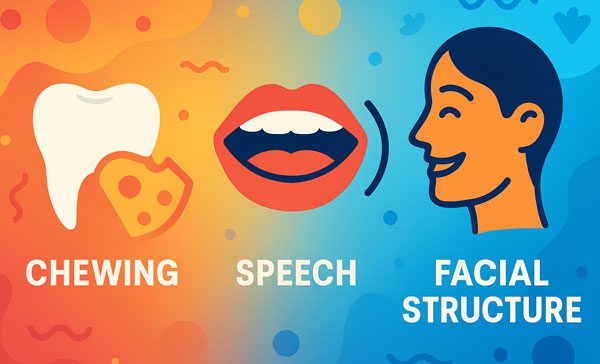
- Chewing Ability: Dental implants provide stability and support similar to natural teeth. Unlike removable dentures that can shift and become uncomfortable while eating, implants securely anchor in the jawbone, allowing seniors to enjoy a wide variety of foods without hesitation or fear.
- Speech Improvement: When teeth are missing, the alignment of remaining teeth can lead to speech issues, such as difficulty pronouncing certain words. Dental implants help fill in these gaps, allowing for a more natural speaking experience.
- Facial Structure: Missing teeth can lead to changes in a person’s facial structure, giving an aged appearance. Implants help maintain bone density and facial contours, giving seniors a more youthful look that can boost their overall confidence.
Long-Lasting Solution Compared to Removable Dentures
Another compelling reason for seniors to opt for dental implants is their longevity compared to removable dentures.
- Durability: Dental implants are designed to last a lifetime with proper care. In contrast, dentures may require replacement every 5 to 10 years due to wear and tear, resulting in ongoing costs.
- Ongoing Maintenance: While both options require some level of upkeep, the maintenance for implants is generally more straightforward. Good oral hygiene practices can ensure the longevity of implants without the need for frequent replacements.
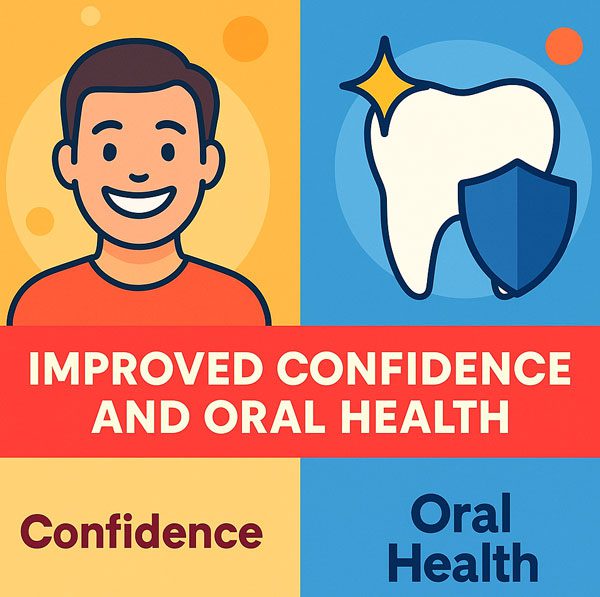
Improved Confidence and Oral Health
The psychological and emotional benefits of dental implants are equally significant.
- Improved Confidence: Many seniors report that dental implants have revitalized their self-esteem, enabling them to smile freely and interact socially without the embarrassment associated with missing teeth.
- Health Benefits: Better oral hygiene is also a byproduct of choosing implants. With the ability to clean teeth effectively, seniors can maintain better gum health and prevent conditions such as gum disease, which can lead to more severe health issues if not addressed.
No More Worries About Slipping Dentures
For seniors who have been through the experience of using removable dentures, the anxiety surrounding their stability can be overwhelming.
- Security: Dental implants eliminate the concerns about dentures slipping during eating or speaking, allowing seniors to enjoy their meals and conversations without interruptions.
- Active Lifestyle: With the security implants offered, seniors can partake in social activities, dining outings, and events with ease, thereby enhancing their quality of life.
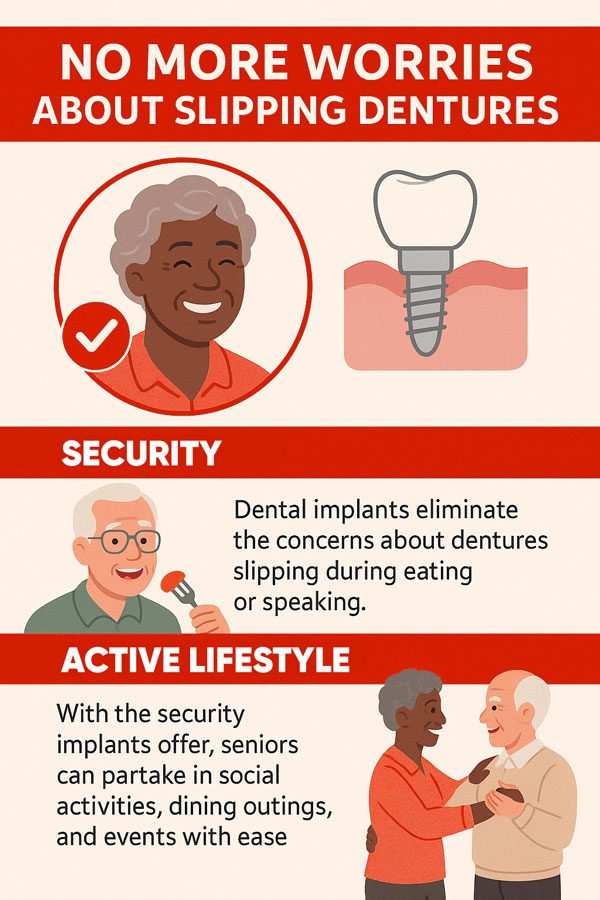
Common Concerns for Seniors Considering Implants
Despite their numerous benefits, seniors may still have concerns regarding dental implants. This section will address some of those worries, offering clarity on each aspect.
Age Is Not a Barrier — Health and Bone Quality Matter More
One common misconception about dental implants is that age itself can disqualify individuals from receiving them.
- Health Over Age: What’s crucial is an individual’s overall health condition and bone quality. Seniors who are in good health are generally eligible for implants, regardless of their age.
- Bone Quality: In some instances, bone density may be a factor. Luckily, many clinics offer procedures, like bone grafting, that can improve bone quality, making it suitable for implants.
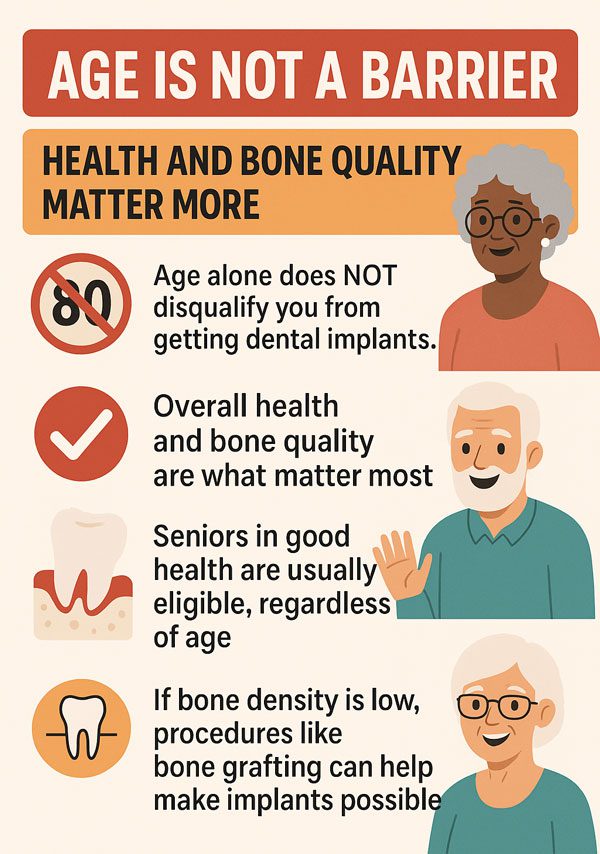
Conditions Like Diabetes or Bone Loss Can Be Managed
Seniors facing health conditions like diabetes or osteoporosis may be concerned about whether they can safely undergo dental implant procedures.
- Condition Management: As dental professionals are increasingly equipped to handle specific health conditions, plenty of options exist for those managing diabetes or other ailments. Close monitoring and lifestyle adjustments may be adopted to promote healing and integration of the implants.
- Denture Replacement for Seniors: For elderly patients needing complete tooth replacement, options such as All-on-4 or All-on-6 implant techniques may also provide a suitable solution by offering implant options tailored to their specific conditions.
Implant Types Suitable for Seniors
Seniors have several implant types to consider, ensuring there is a solution for everyone.
- Mini Implants: Mini implants are less invasive and require less bone density, making them an excellent option for seniors who might not qualify for traditional implants.
- All-on-4 and All-on-6 Implants: These innovative full-arch solutions look promising for those needing substantial restoration. The All-on-4 approach uses just four implants, while All-on-6 uses six implants to support an entire arch of fixed teeth, drastically reducing healing time and providing a permanent solution.
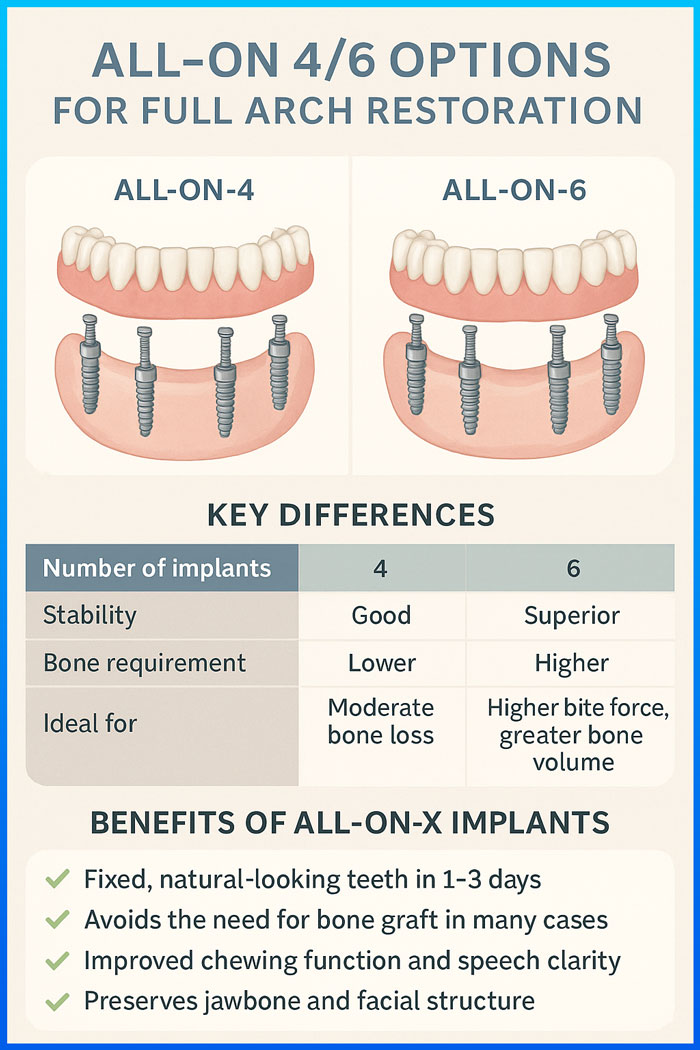
Dental Implants Offers for Seniors
Many clinics and dental practices recognize the importance of making dental care accessible for seniors. This section will explore the available options for seniors when seeking dental implants.
Discounts and Bundled Packages
As demand for dental implants increases, many clinics provide special plans tailored for seniors.
- Senior Discounts: Several dental clinics now offer discounts specifically for senior citizens, which can significantly reduce the overall costs associated with dental implants.
- Bundled Packages: Some clinics may also bundle services, offering joint discounts for multiple procedures or comprehensive care, making it more financially feasible for seniors looking for more extensive dental restoration.
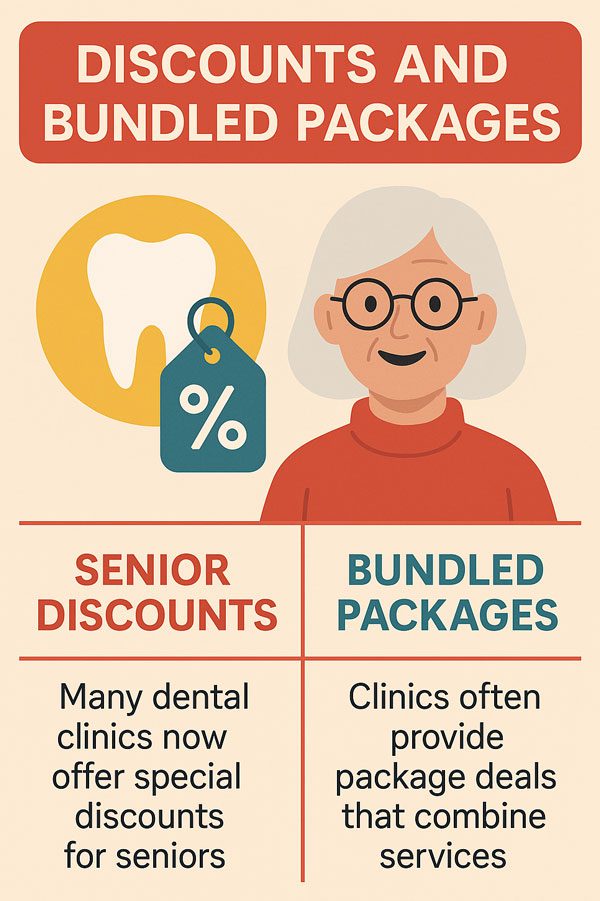
Limited-Time Offers
Seniors looking for dental implants offers for seniors should keep a keen eye out for promotions.
- Limited-Time Discounts: Certain clinics provide limited-time promotions or seasonal discounts that can decrease the cost of implants substantially. Signing up for newsletters from local dental clinics might yield fruitful updates on such offers.
- International Providers’ Offers: Some seniors may consider international dental tourism, where several clinics offer attractive packages for dental implants, making them more affordable compared to local prices.
Insurance Coverage and Installment Plans
Understanding insurance coverage is crucial for seniors contemplating dental implants.
- Utilizing Coverage: Many dental insurance plans offer varying levels of coverage for implants. It’s often worth reviewing your insurance policy or discussing your options with the insurance provider.
- Flexible Payment Options: For those without sufficient insurance coverage, many dental clinics provide financing plans that allow seniors to pay for dental implants over time, easing the financial burden.
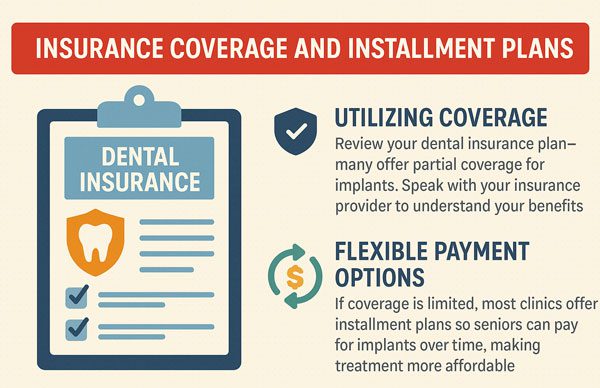
Free or Cheap Dental Implants for Seniors
Finding affordable dental care can be a daunting task, especially for seniors on fixed incomes. This section will discuss possible solutions for obtaining free or cheap dental implants.
Community Dental Programs
Many community programs aim to assist low-income seniors needing dental care.
- Non-Profit Organizations: Organizations like Dental Lifeline Network frequently provide services to seniors requiring implants at no cost, focused comprehensively on accessibility.
- Local Health Departments: Seniors can inquire about dental programs offered by local health departments, which might administer free or low-cost dental treatment options.
University Dental Schools
An often overlooked option involves dental schools, which offer services to the public at a fraction of the usual cost.
- Supervised Care: Treatment performed by students is supervised by licensed professionals, ensuring that care remains quality-focused while also being affordable.
- Affordable Solutions: Seniors considering their options may save significantly by seeking implant services at dental schools, where costs can be significantly reduced due to clinical training programs.
Government Assistance
While it’s important to note that programs such as Medicare may not always cover implants, Medicaid may play a significant role in some areas.
- State-Specific Benefits: Seniors should investigate what their state offers in terms of Medicaid coverage, as some states do cover dental implants under certain conditions.
- Low-Income Programs: There may also be low-income dental programs provided through state-funded organizations that cater strictly to seniors.
Caution: Avoid Low-Quality Clinics
Finding accessible dental care is essential, but seniors must balance affordability with quality.
- Researching Clinics: It’s crucial to perform due diligence before selecting a lower-priced clinic. Often, quality was sacrificed in favor of price reductions, leading to potential complications.
- Checking Reviews: Reading patient reviews or seeking recommendations can aid in ensuring the chosen clinic offers safe and effective procedures.
What Is the Cost of Dental Implants for Seniors?
Understanding the cost of dental implants for seniors is crucial for informed decision-making. This section will lay out the typical expenditures tied to dental implants, examining various factors.
Average Costs
The cost of dental implants can vary significantly based on local markets and required services.
- Single Implant: In the United States, a single dental implant averages between $2,500 and $4,000, dependent on quality and brand selection. Generally, the price reflects the complexity and skill needed to perform the procedure successfully.
- Full Mouth Solutions: A complete mouth restoration using the All-on-4 method, which is ideal for seniors needing comprehensive dental replacement, can range between $15,000 and $30,000. This solution replaces all upper or lower teeth with four strategically placed implants.
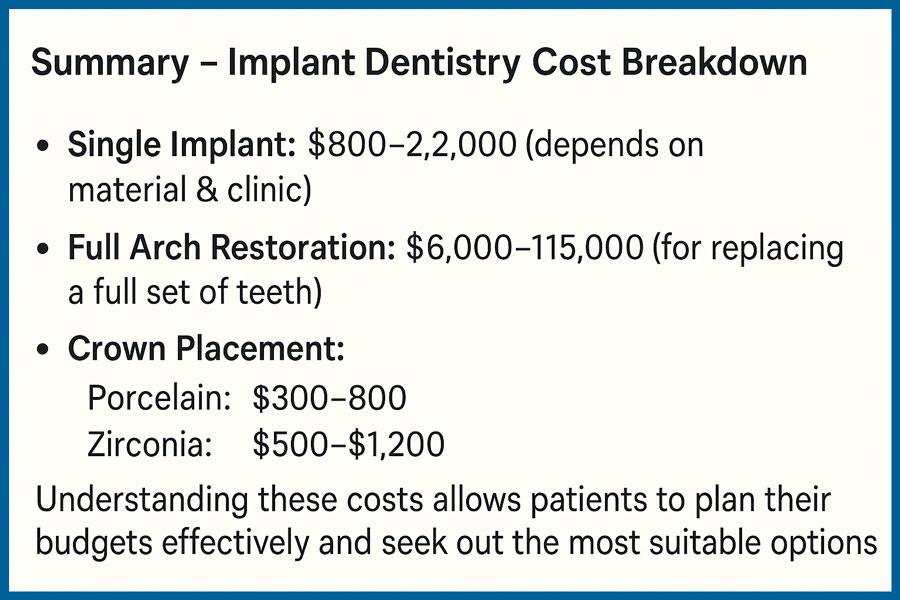
Lower Costs Abroad
Many seniors find alternative options by looking internationally for dental treatments.
- Affordability: Countries such as Mexico, Costa Rica, and Hungary offer implants for significantly less—often between $800 and $1,500 per implant while maintaining quality service.
- Dental Tourism: Some American seniors opt for dental tourism, where they travel to countries with favorable implant offers, combining vacation experiences with necessary dental work.
Factors Affecting Price
Several aspects can influence the overall cost of dental implants, which are essential to consider.
- Number of Implants: Naturally, the more implants needed, the higher the cost. Seniors should accurately assess what is required to avoid unforeseen expenses.
- Material Choices: The material used in the implants will directly affect the price, with titanium implants generally more expensive than alternatives, but providing superior results.
- Location: Prices vary depending on geographical location. Urban centers might have inflated costs compared to rural clinics.
- Need for Bone Grafting: If a senior lacks sufficient jawbone density, a bone graft may be required as an additional expense before the implants can be placed.
Comparing Dentures and Implants for Seniors
Choosing between dentures and implants can be a complex decision. This section aims to provide a clear comparison of both options concerning various features crucial with age in mind.
Stability
- Dentures: Removable dentures often create apprehension, as they can slip and affect chewing and speaking abilities. Many seniors may find themselves adjusting or readjusting dentures during daily life.
- Dental Implants: Being fixed firmly in place, dental implants offer stability that instills confidence for eating and social interactions.
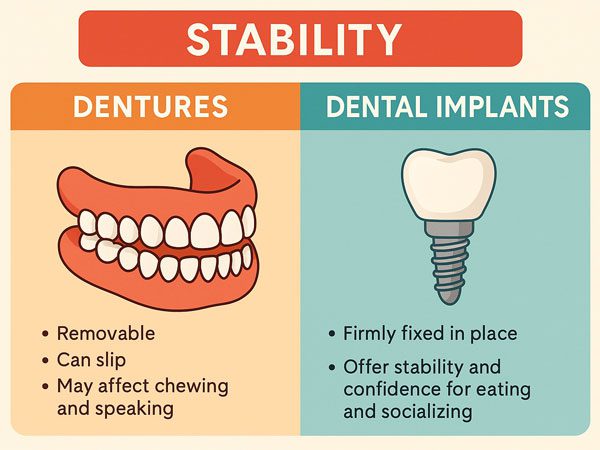
Comfort
- Dentures: The fit of dentures can change over time, possibly leading to sore gums and excess irritation when wearing them consistently.
- Dental Implants: Implants feel similar to natural teeth, providing comfort and ease without the hassle of adjustment needed with dentures.
Longevity
- Dentures: The lifespan of dentures typically runs between 5 and 10 years, after which they may need replacement.
- Dental Implants: With proper care and oral hygiene, dental implants can last over 15 years and often even longer, making them a more economically sound investment in the long run.
Bone Preservation
- Dentures: They do not promote bone health, as they do not stimulate the jawbone.
- Dental Implants: Implants play a vital role in maintaining and even stimulating jawbone integrity, preventing bone loss that often occurs post tooth extraction.
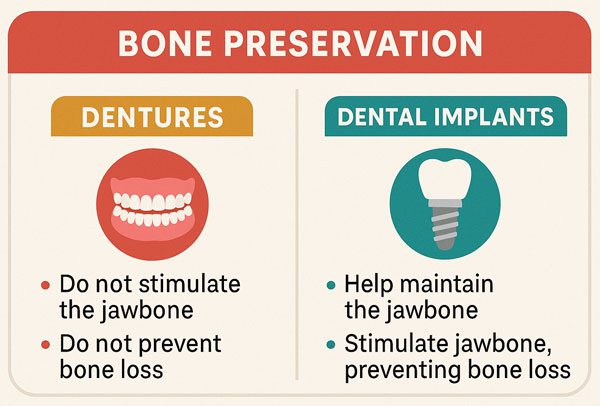
Cost
- Dentures: Although they have a lower upfront cost, individuals may incur higher long-term expenses as replacements and adjustments are necessary.
- Dental Implants: While the initial expense is higher, the durability and longevity of implants make them a beneficial choice over time.
How to Get Started
Seniors considering dental implants must take several initial steps to ensure they are well-informed and prepared for the process ahead.
Book a Consultation for Oral Health Assessment
The starting point is to consult with a dental professional.
- Oral Evaluation: These consultations will include thorough oral health assessments, helping to identify individual needs and whether implants are a suitable option.
- Personalized Recommendations: A good dentist will provide tailored advice based on one’s specific situation, including discussing potential benefits or concerns that may arise based on overall health.
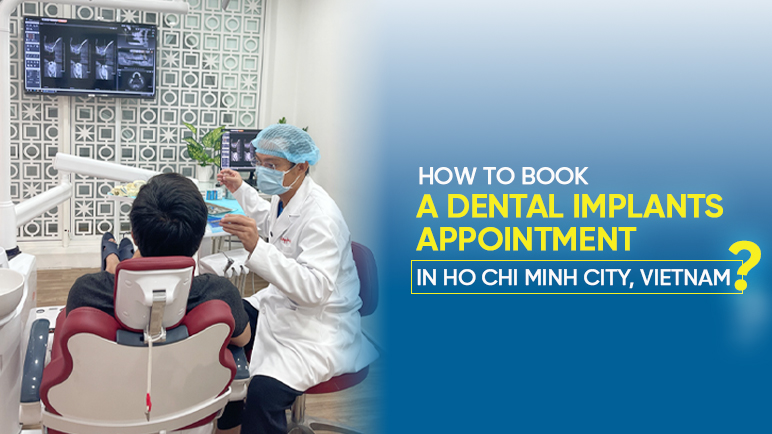
Request a Personalized Quote
After the oral health assessment, seniors should follow up with a detailed treatment plan.
- Cost Estimates: Clinics can provide a breakdown of expected costs, ensuring transparency and helping patients understand what to expect throughout the process.
- Check for Senior Discounts: Before making decisions, seniors should inquire about available discounts or payment plans that can ease financial burdens.
Ask About Payment Options or Financing Plans
Understanding the payment options available is crucial for seniors.
- Payment Flexibility: Many dental offices are willing to work with patients regarding financing plans, allowing individuals to budget accordingly over time.
- Insurance Inquiry: Discussing coverage options with insurance representatives may present unexpected assistance, making the dental implant process more accessible.
Research Well-Reviewed Clinics
When choosing a dental clinic, seniors should perform substantial research.
- Online Reviews: Take the time to read patient reviews and experiences, allowing for more informed decisions.
- Recommendations: Asking friends or family members for personal recommendations can ease concerns about safety and quality.
Conclusion
Dental implants for seniors represent a transformative solution to oral health issues that significantly enhance comfort, functionality, and confidence. Understanding the various options available, financial considerations, and the steps to access affordable care is pivotal for older adults contemplating this essential dental procedure. By taking proactive measures and researching the myriad of implant options, seniors can invest in their oral health, ensuring a better quality of life. Whether exploring local clinics or considering dental tourism for cost-effective solutions, taking this step can lead to long-lasting benefits and improved well-being. Explore affordable and safe implant options today, including resources for cheap or potentially free solutions for seniors.

 Google Reviews
Google Reviews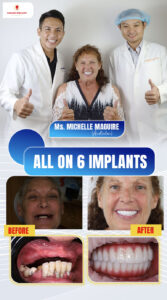


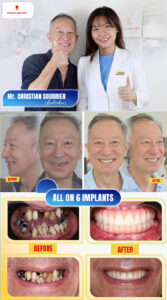
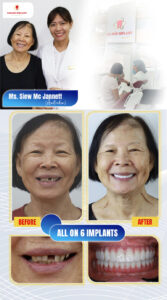

 Call
Call
SAIGON IMPLANT CENTER
Best dentist in Vietnam
Saigon Implant Center - Dental Clinic utilizes the latest technology for specialized treatment in the field of Single implant, full jaw implants, All on 4 implants, All on 6 implants, Zygoma implant....
SAIGON IMPLANT CENTER
Best dentist in Vietnam
Saigon Implant Center - Dental Clinic utilizes the latest technology for specialized treatment in the field of Single implant, full jaw implants, All on 4 implants, All on 6 implants, Zygoma implant....